News
‘No Quick Fix’ For Lake Windermere’s Sewage Spill Problems
Sewage spills around the UK hit the headlines these days more often than not, with water suppliers the length and breadth of the country increasingly coming under fire for such incidents.
Many of these are permissible within the limits of environmental permits, with the aim being to prevent sewage from backing up into properties during periods of heavy rainfall, but illegal spills are becoming more commonplace, as well as dry spills where untreated sewage is released into waterways when there is no weather-related need.
Discharge of sewage into rivers, lakes and streams adds phosphorus to the water, which leads to the growth of significant algal blooms. These then starve the water of dissolved oxygen, affecting local biodiversity and putting aquatic species at risk.
One of the most well-publicised algal blooms is, of course, the one affecting Lake Windermere, the biggest natural lake in England that was formed in a glacial trough around 12,000 years ago… so it’s fair to say that it’s something of a historical icon and, you would think, should be worthy of protection as a result.
Lake Windermere pollution scandal
For years now, excessive nutrients have been entering Lake Windermere, with United Utilities (the supplier responsible for the catchment area), the National Park Authority and the Environment Agency failing to manage the situation, according to campaigners Save Windermere.
While multiple factors have contributed to the degradation of the water, including agricultural surface runoff, septic tank use and climate change, it is believed that the most significant contributor is sewage discharge. As such, addressing this issue first will have the biggest impact on water quality – before it’s too late for the lake.
Untreated sewage spillages have been taking place in Windermere for a prolonged period. In 2020, for example, spillages took place over a total of 7,236 hours… and by 2023, this had increased to 8,787 hours.
At the same time, the focus appears to be more on profits and shareholder dividends than environmental protection, with United Utilities emerging as one of the worst offenders of them all.
In 2022, the company saw market capitalisation of £7 billion, with £1.6 billion in returns to investors between 2015 and 2020. Over the same five-year period, a comparatively low £40 million was invested in the Windermere catchment area.
As the campaign group explains, the decision was made by the firm not to invest in the removal of discharges on the basis of costs over a period of ten years. But with climate change increasingly taking hold around the country, it will become more important to address the issue – or potentially say goodbye to the lake forever.
What is United Utilities doing?
In 2024, United Utilities was accused of reporting failures in relation to over 100 million litres of raw sewage that had been dumped illegally in Lake Windermere over three years.
Company CEO Louise Beardmore, who late last month (February) faced questions from MPs on its spillage track record, described this increase as “heartbreaking”, admitting that improvements must be seen, the BBC reports.
She explained, however, that the issues facing the lake won’t be fixed instantly, with a series of infrastructure programmes required to deliver a solution. Thus far, a programme to rebuild the wastewater treatment works around Windermere has been fast-tracked, with the hope being to improve water quality.
However, it seems that this may be paid for via customer funds, with bills expected to rise by 32 per cent over the next five years, which will help pay for a £13.7 billion investment scheme that will address issues all over the region.
Elsewhere, environment secretary Steve Reed has pledged to strive towards a future where only rainwater enters Lake Windermere, saying that the government would work with United Utilities, environmental groups and local authorities in Cumbria to develop a feasibility study, with the aim being to eliminate all discharges into the water.
Initially, the government plans to find new ways to reduce pollution from private sewage discharges, including new treatment plants and schemes that would allow owners of package treatment works and septic tanks to ask for connections to the mains sewer system.
However, no deadlines for this feasibility study have been made public and it’s possible that if the plans are approved at some point, customer bills could increase even further. As ever, it’s very much a case of “watch this space” to see what happens… but what cannot be denied is that time, for Lake Windermere, is most certainly of the essence.
